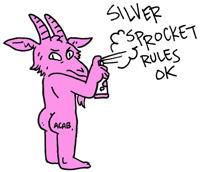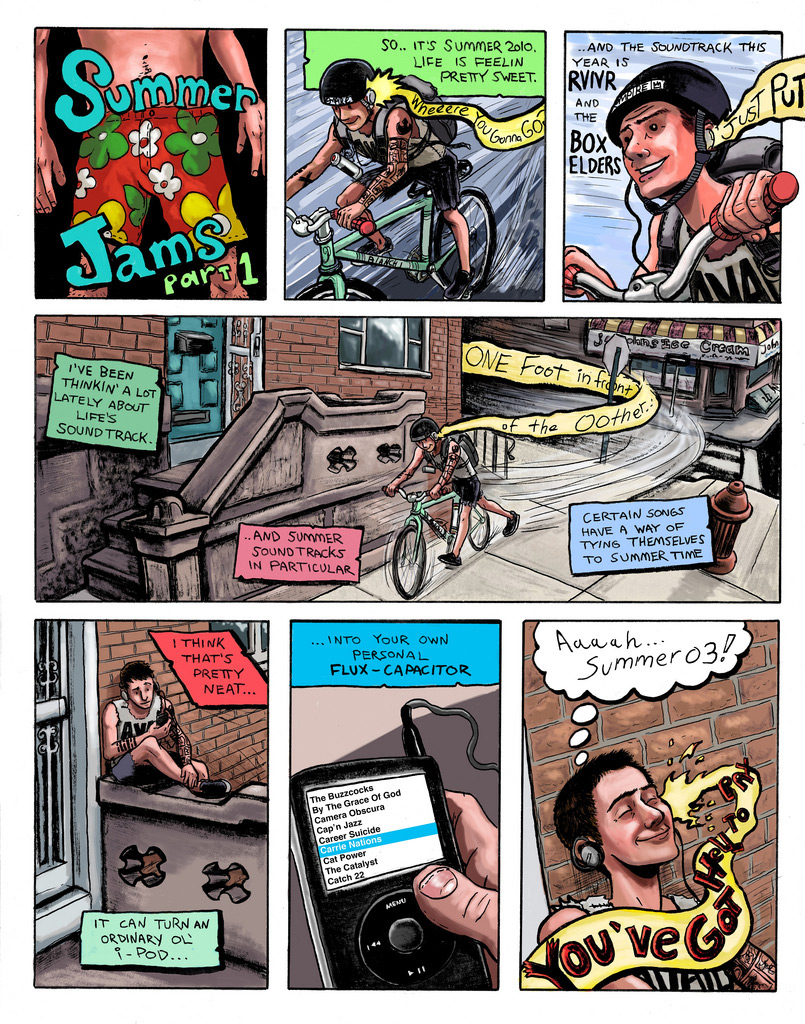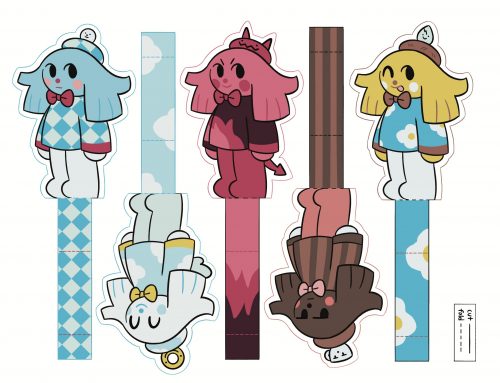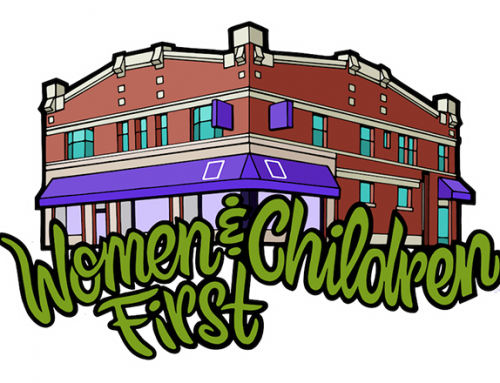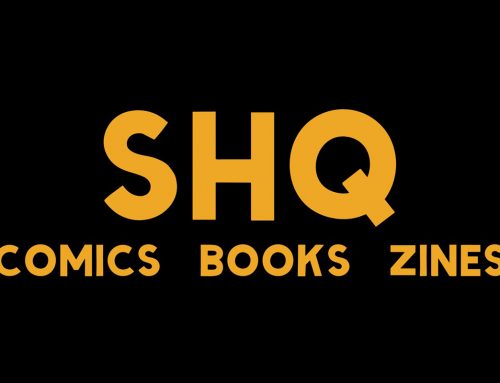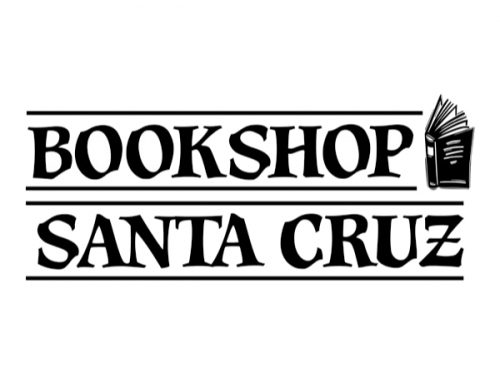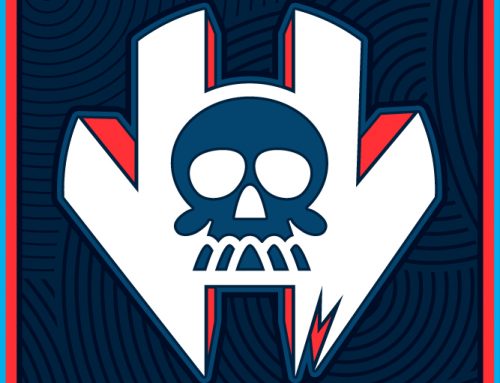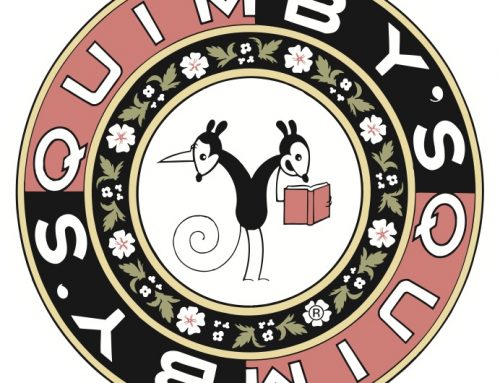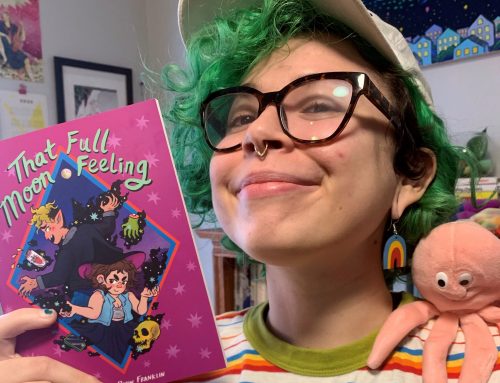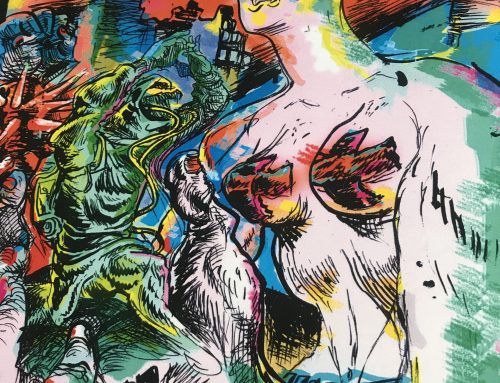A lot of artists got their start with drawing in their younger years, and our pal Jim Kettner is no exception. But what many artists don’t do is consider themselves writers, at least, not in the traditional sense. For Kettner, however, drawing and storytelling have always gone hand in hand, as he finds inspiration in both the art and words of others.
Keep reading to find out about Kettnerd’s writing and drawing influences, how he came to live in a place called Book House, and what success means for him personally.
Interview by Natalye for Silver Sprocket
For those who don’t know you, describe yourself using only song lyrics.
Wake up and live your life see what there is to see
I won’t sit around all day cause life means more to me
So many kids content to sleep their lives away
But I’m gonna try to make the most out of this day
It takes some motivation, it takes some love for life
Why just sit complacent and let life pass you by
Boredom is a choice I choose not to make
Unlock that door, strive for more, there’s a better path to take
What are the circumstances that led to you having your art featured in As You Were?
Punk is a small town, ya know? I’ve been buddies with the awesome and talented Liz Prince for a really long time. She was actually the first person to really push me into doing auto-bio material. I had been drawing mostly sci-fi and superhero type stuff, but a few years ago there had been a call to make a comics page for the website If You Make It. She was basically like “Dude, you’re a comics punk, you’re an idiot if you don’t jump on this.” That led to a series of my first webcomics that focused on underground music culture. I was super insecure about writing non-fiction at first, but it turned out to be really fun. Flash forward a couple of years to when Mitch was pulling together As You Were #1. I had never met Mitch before, but I think he had seen my work on IYMI, and once again Liz had passed along my info and by proxy sort of gave me a shove to make some new comics. Unfortunately, I was super duper busy with grad school at that point and didn’t have time to jump back into the punk comix game ‘til issue #2.
How did you first get into making art? What were or are some of your biggest inspirations, and what forms and mediums do you like best?
Well, probably like most of the contributors you’ve spoken with, I’ve been making pictures and stories since I was a really small kid. I’m just lucky I never grew out of it. I was one of those kids who could sit super content as long as I had a sketchbook or some action figures handy. I was always making up new characters or playing roleplaying games. I always loved comics, but by the late 80s I had discovered an old school, grimy, hole-in-the-wall comic shop one town over from where I lived and went from being a causal corner store comics reader to a member of the true faith—a back issue-digging comics explorer. The book that really made my head spin around that time was Walt Simonson’s run of Thor comics. That was the first book I read that was written and drawn by a single creator, and it was filled with all this completely bonkers sci-fi/mythology mashup. But yeah, that was the first time it clicked that I could write and draw my own stories, and that was 100% what I wanted to do.
Later in high school, I worried that my drawings weren’t up to snuff and I almost gave up. I was convinced that my comics sucked eggs. I was never going to draw Uncanny X-Men, you know? I struggled through three-point perspective lessons from How To Draw Comics The Marvel Way and considered film school as an alternative way to scratch that storytelling itch. Fortunately, I had one of those heroic high school teachers who really encouraged me, and I ended up studying Illustration at the School of Visual Arts in NYC.
From then on, my comics diet expanded exponentially, and I was reading all different kinds of material, from dystopian sci-fi of Enki Bilal, to Jessica Abel’s slice-of-life Artbabe, Jason Lutes’ clockwork masterpiece of comics storytelling historical fiction in Berlin, [and] hardcore comics reporting from folks like Joe Sacco. I read everything I could get my mitts on, and I’d like to think my own comics reflect that balanced diet of diverse comics. I think I’ve been picking up important storytelling lessons from all these different influences, and they occasionally peek out. A little bit of Paul Pope here, a little Jaime Hernandez there.
I think my stuff is really influenced by film and prose as well. I read a lot of fiction and write prose…I think form has to fit function, you know? Some stories are ideally suited to comics, others not so much.
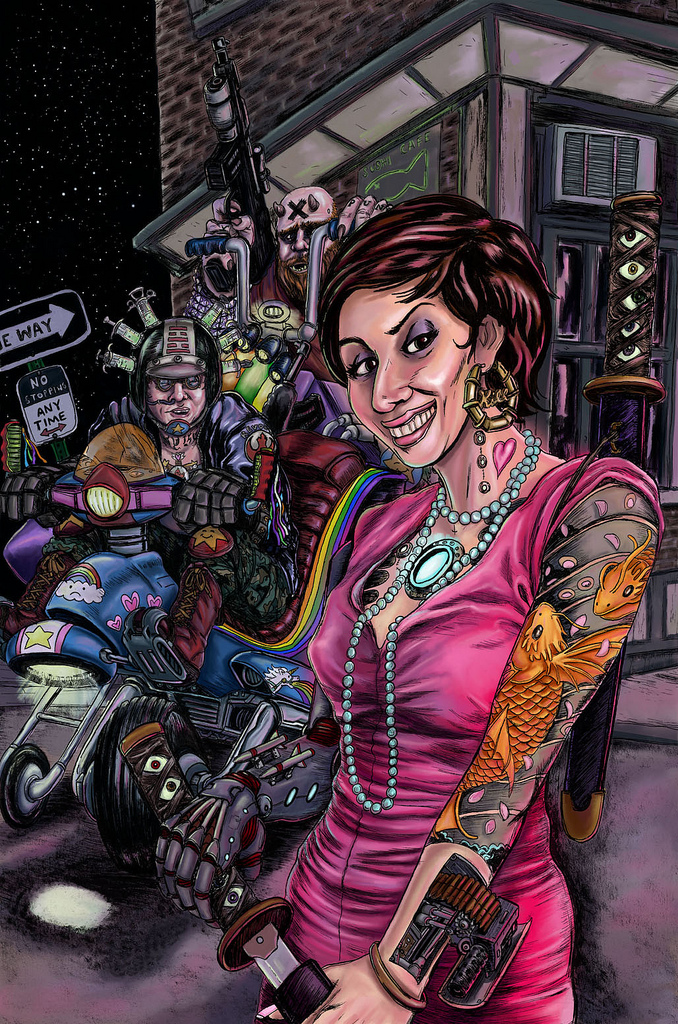
Your contribution to As You Were talks in part about moving across the country for education, a chance on love, and just to do something new for yourself. How important was that change of scenery for you? What sort of lessons did you learn (aside from the fact that it’s not easy to juggle a master’s degree and a social life at the same time)?
I think it’s important for everyone to shake up their routines occasionally. It’s very easy for things to get stagnant if you’re not careful. I struggle with it, [and] I saw many friends struggle with it in New York and in Philly. Sometimes it means you need to throw yourself into a new project, or line of work; sometimes it means skipping town. When things get too comfortable for me, I just get itchy or something…and it’s not that I think that everything neeeeds to be some grueling struggle, but I do think that if we stop challenging ourselves, we are selling this whole human experience short.
It’s weird because I’m creeping closer and closer toward “settling down” age, but I’m less and less convinced that I would ever say “this is it, this is where I want to be for the rest of my life.” If anything, leaving a sheltered cheap punk paradise like Philly reminded me that I have the power and ability to do it again and again. I’ve been living in Oakland for over three years now, but it doesn’t feel permanent. I spend a lot of time thinking about what’s next, where can I live where I’ll get to spend some time around best friends? What would be a great adventure for me and my partner? What other places do I want to experience living in before I really am too old to hop around as much?
But yeah, as far as the learning experience of going back to school…it was just fantastic. The MFA in writing program at CCA felt really special. We had our own private studio with a zen garden that only the MFA writers had keys to, so my first visit there literally felt like having a secret entrance into a Hogwarts common room or something.

How did going to CCA help you with your creativity? Did you go for drawing or for writing? What sorts of things were the most beneficial in growing your artistic abilities? Did you find that while you were studying one skill/specialty that it somehow informed the others? And if so, in what ways?
Grad school had a ton of interesting challenges, not the least of which was a total shift in focus from visual art to literary art.
As I mentioned earlier, storytelling was always the primary motivation for everything I made, even as a little kid. Even a bunch of my standalone illustrations are very narrative in nature. The…writing program forced me to abandon the crutch of my ability to draw pretty pictures. The pieces I submitted for critique had to be compelling on their own merits without that visual component. This was super intimidating at first. I imagined my peers were all going to be super stuffy poets who wouldn’t respond to what I had to say or how I expressed it. What I realized though was that writing meant flexing my visual imagination constantly, imagining people, conversations, and emotions of this fictional world in my head. My job, as ever, was to put those ideas on paper, just using a different set of tools.
When I write and it’s going well, I really just sink into the story in my head. Like total trance mode. The story plays out like a movie and I find that the job, for the first draft at least, is to just write down what I see. My prose style is very conversational, very informal, and that helps with the flow of information. In a way, this shift was completely liberating, because I didn’t have to agonize over how to execute any given image, or dig up reference photographs, or worry how much space on a page a particular sequence would take up. Writing a scene is MUCH much faster than having to draw it. I leaned a lot about pacing and transitions. Sometimes I was able to translate certain skills and storytelling ticks I picked up from comics and apply them to prose. My classmates got lots of cliffhanger endings to my chapters.
Another important lesson from grad school was really the benefits of review and revision. In comics, especially indie comics, you know, we kind of all create our stories in a little vacuum, and when they’re ready to put up on the interweb, or we’re lucky enough to have someone like Avi who will publish us…you know, it’s a done deal. People can critique the work, but there is much more of a focus of getting it done and getting the work up in front of eyeballs. That’s all well and good, but I’ve seen so many original graphic novels that seemed to need an editor. Someone to help the artist trim the fat, or make sure that all the plot threads connect in a satisfying way in the end. So my writing program really informed how I thumbnail my projects. Figuring out the pacing and puzzle of the story before I commit to inking a tome…because nobody is going to want to redraw a chapter once it has been inked. I also find my instincts for dialogue and chapter construction are much sharper after my time at CCA.
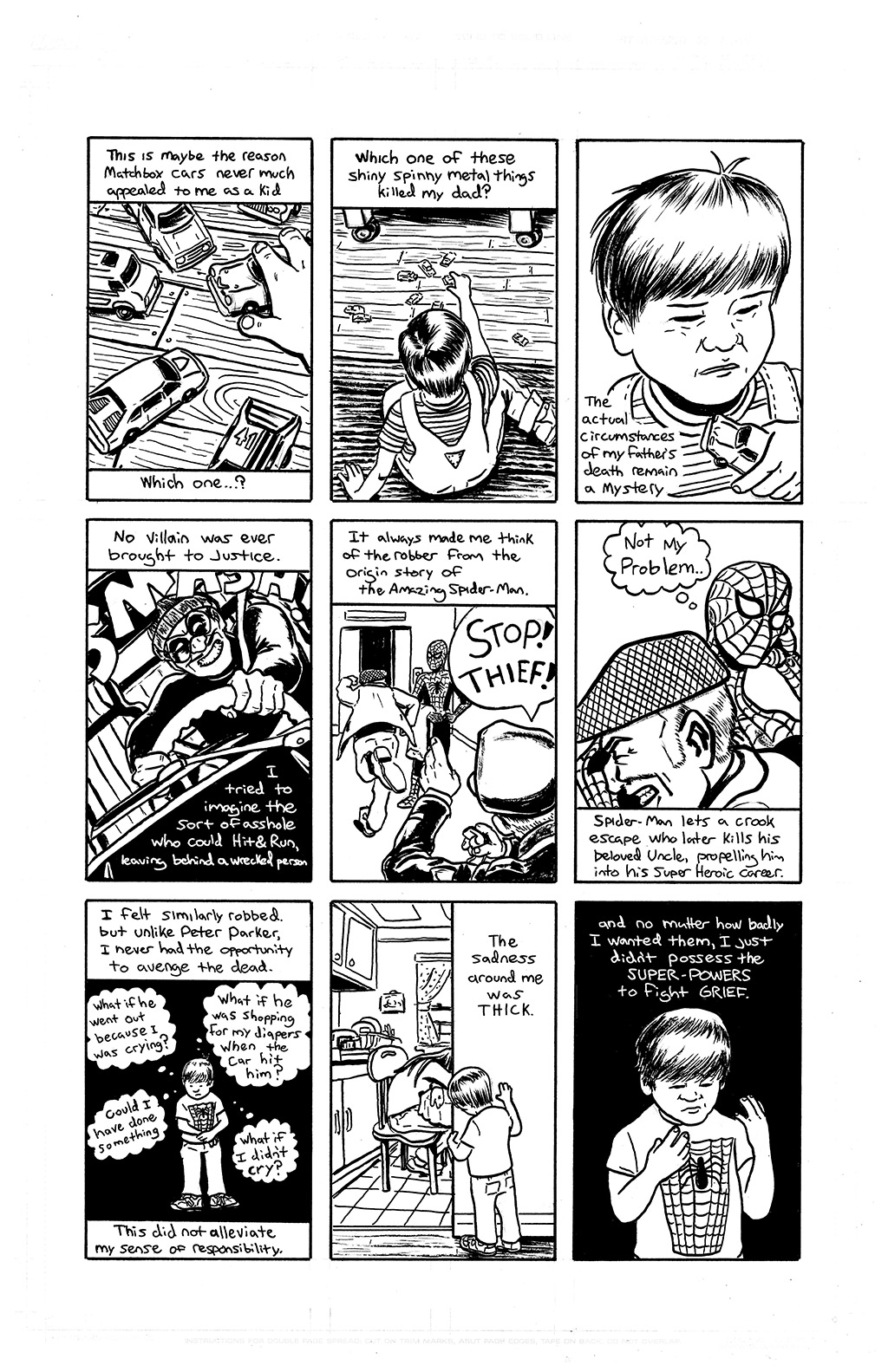
For awhile, you used to live in Philadelphia in a place called Book House. Was it a house made of books? Or filled with books?
Not MADE of books, though that would be amazing. I’m a big reader. I’m always reading a couple of books at a time and listen to audiobooks when I draw. I was excited when we found the house because it was half a block from the Free Library of Philadelphia, a resource that I ended up not taking as much advantage of as I had imagined. But anyhow, the other connecting thread was that most of the people who lived in Book House were big Twin Peaks nerds. It was probably the one piece of pop culture that we all agreed on, and Twin Peaks features a little secret society called the Bookhouse Boys, so we just ran with that. We did have a lot of books in the house though. Me and my then-housemates Jon and Cody read a ton, and we decided to keep all of our book collections in our common space and have a sort of informal lending library. So that if any of our neighbors—we were kind of in the center of a ring of South Philly punk houses like The CATsle, the Funeral Home, and Sweet Sixteens—if anyone wanted to borrow one of my Ursula LeGuin novels, or some of Cody’s X-Men comics, or Jon’s copy of The Golden Bough, then it was there for them to sign out.
For a hot second, we even had CB radios set up and would have morning announcements with the other punk houses. All the Book House call signs were author names like J.K. Rowling and Danielle Steele.
You’ve said that you used to be in a hardcore band. What bands have you played in? Are you in any bands now?
Sigh…So my one and only band experience thus far was in my final months in Philly. We were called Eyes Of Ibad, and we were a super duper nerdy HC band. It started as a joke, fondly remembering all of the hardcore bands in the 90s who were named after things from the Dune novels, or would sample stuff from the David Lynch film. I was always frustrated that none of those bands ever actually sang about the stuff from the novels though. I was lucky enough to be in the right time and place as other science fiction-loving punks who wanted to be involved in a project like that. We only had six songs and only played six or seven times, but our set was very narrative and roughly followed the arc of the first book. I used to think it would have been rad to make a 7-inch for each novel…the music would have to get progressively weird by the time we got to Chapterhouse: Dune; we wanted to build stillsuits and props and be like a sci-fi R.A.M.B.O., but it was not to be. All of the members ended up moving from Philly, but I would be in another project with those folks in a second.
I’m not currently in a band; that was another hobby that got sidelined by grad school, but now that I’m out I would love to do it again. My partner has been really itching to be in a band. She just recorded guest vocals on a friend’s new record. This weekend she’s gonna play the song live for the first time and I’m super stoked for her. We’ve talked about doing a project together for years, but all either of us can do is scream, so we’re sort of at the mercy of having friends with the free time who want to start something new with us. And even then, I think she wants to be in a band like Saetia or Hiretsukan, and I want to sound like old Chumbawumba but with youth crew mosh parts. So anyone out there who wants to combine those influences and write songs for us to scream dual vocals over…we are game!
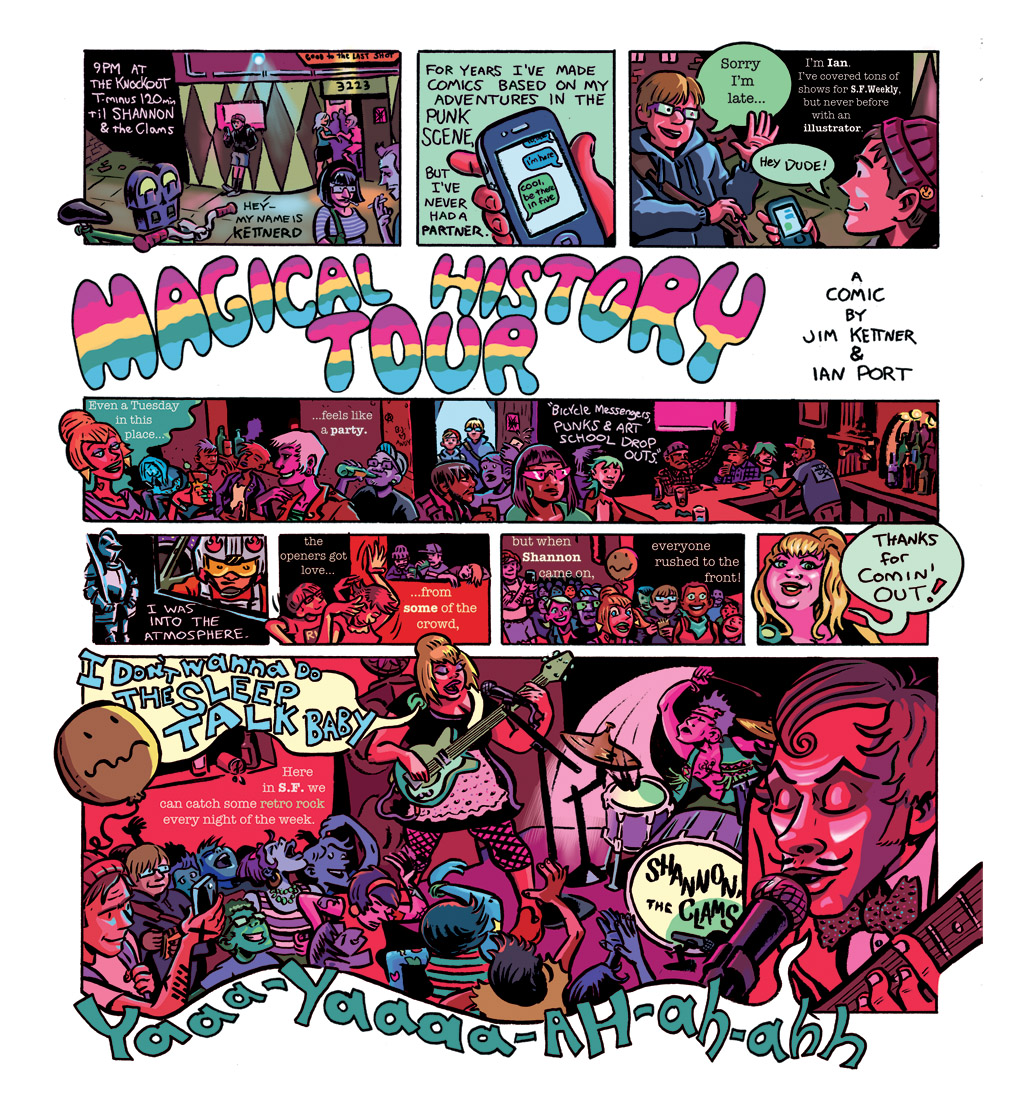
A lot of your work touches on themes of punk rock, be it trying to find the heart of scenes in different cities or trying to continue living a punk rock life as you get older. What are some of the challenges of getting older but still staying connected to punk? What parts of punk rock ethics are still a part of you and important to you, versus the parts that you’ve let go of over the years (whether willingly or not)?
At this point, so much of my punk rock life is really internalized. Like, I go to shows less than I used to, but in some ways I feel more punk than ever…partially because I’m getting older. I’m set in my ways in many respects, and I would be surprised if I didn’t still Identify as punk in another 30 years. I sort of give equal credit to punk and comic books for informing my value system, and in that way, punk will always be relevant to me, be that through my approach to telling stories, or my politics, or my diet, my awareness of privilege and sense of responsibility in regards to others. Punk has had a giant impact on most aspects of my day-to-day. But yeah, I strive to treat friends and strangers and animals with respect and compassion. I give people the benefit of the doubt, but I’m not afraid to call people out on their shit. I recognize the importance of being a self-motivated artist, and that the rewards might not be financially great, but that creating work and contributing to a community—be they punks or comic geeks, or whatever—is incredibly valuable.
As far as shit I’ve let go—again, this is one of the nice things about being older in the scene—the divisions that used to feel really intense are practically insubstantial. I remember being a baby hardcore kid in NYC and I remember going to shows at Coney Island High, or the Wetlands, and people telling me “Yo, don’t go to ABC No Rio, that’s some drunk punk bullshit.” And for a couple of years I just sort of ignored this whole other part of the scene. I finally listened to an Aus Rotten record and was hard pressed to find anything SUPER different from other hardcore I was listening to at the time. I think so much of that is just costume politics. Now I’m old and everyone’s uniform has toned down and it’s much more evident what all the little subgenres have in common. Sometimes it just takes a couple years to Break Down The Walls (yuk yuk).
But there are some challenges to be sure. I’m not in it as much, [and] I’m an older punk in a different city, so going to shows doesn’t have the same faces I’d been used to seeing for 20 years on the East Coast. I’m also just not as aware of new bands and new records. Most of the new stuff I get into are my friends’ new bands (everyone go check out the Everybody Row record!). I know that everything is more accessible with the interweb now, but I felt like I knew more about the current state of punk I cared about when HeartattaCk was still coming out. I would love for a 20-year-old hardcore kid or pop punk [fan] to make me a mixtape though. Seriously, anyone out there who wants to make me a tape, I’ll totally trade. Hit me up.
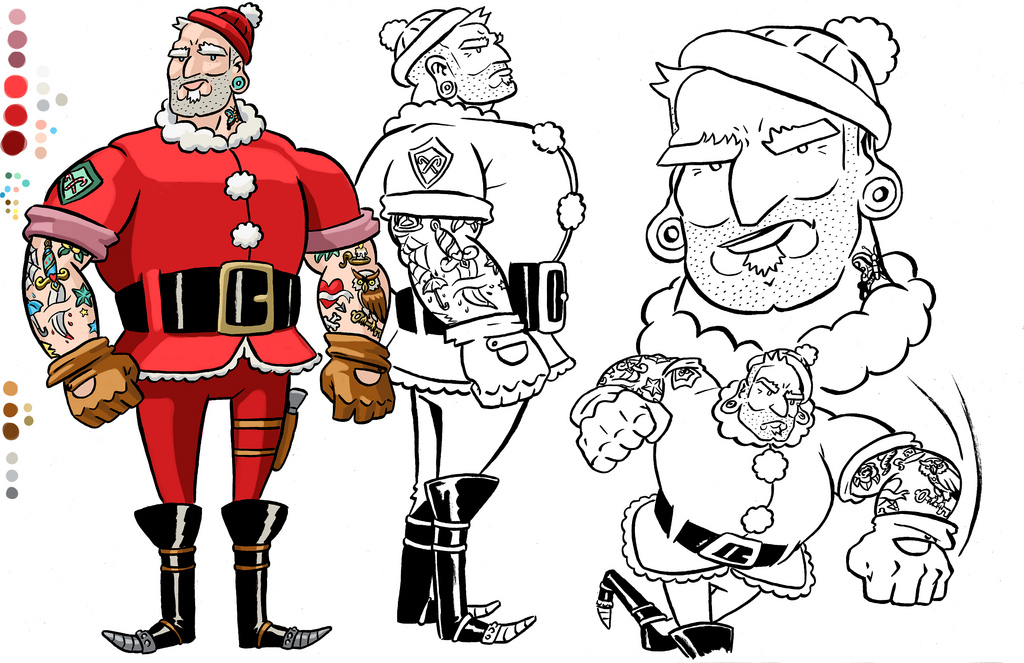
If you could only draw or only write, which would you choose (sorry, this is a terrible question)?
Goddamn, that’s super duper tough. At this point, I think I’d say if I HAD to choose…I would write. Don’t get me wrong, I LOVE to draw. It can be so much fun and so gratifying to really capture a moment with an expressive drawing, but writing seems more sustainable. I constantly worry about getting enough work done. I want to tell stories, and some of the ideas that I have would take thousands of comics pages to tell properly. I get terrible hand cramps from drawing now, so it’s kind of scary to imagine what that’ll be like in 10 years. I plan to continue writing and drawing my own comics, but wouldn’t be surprised if at some point I’m spending more time with a Word program than with Bristol board.
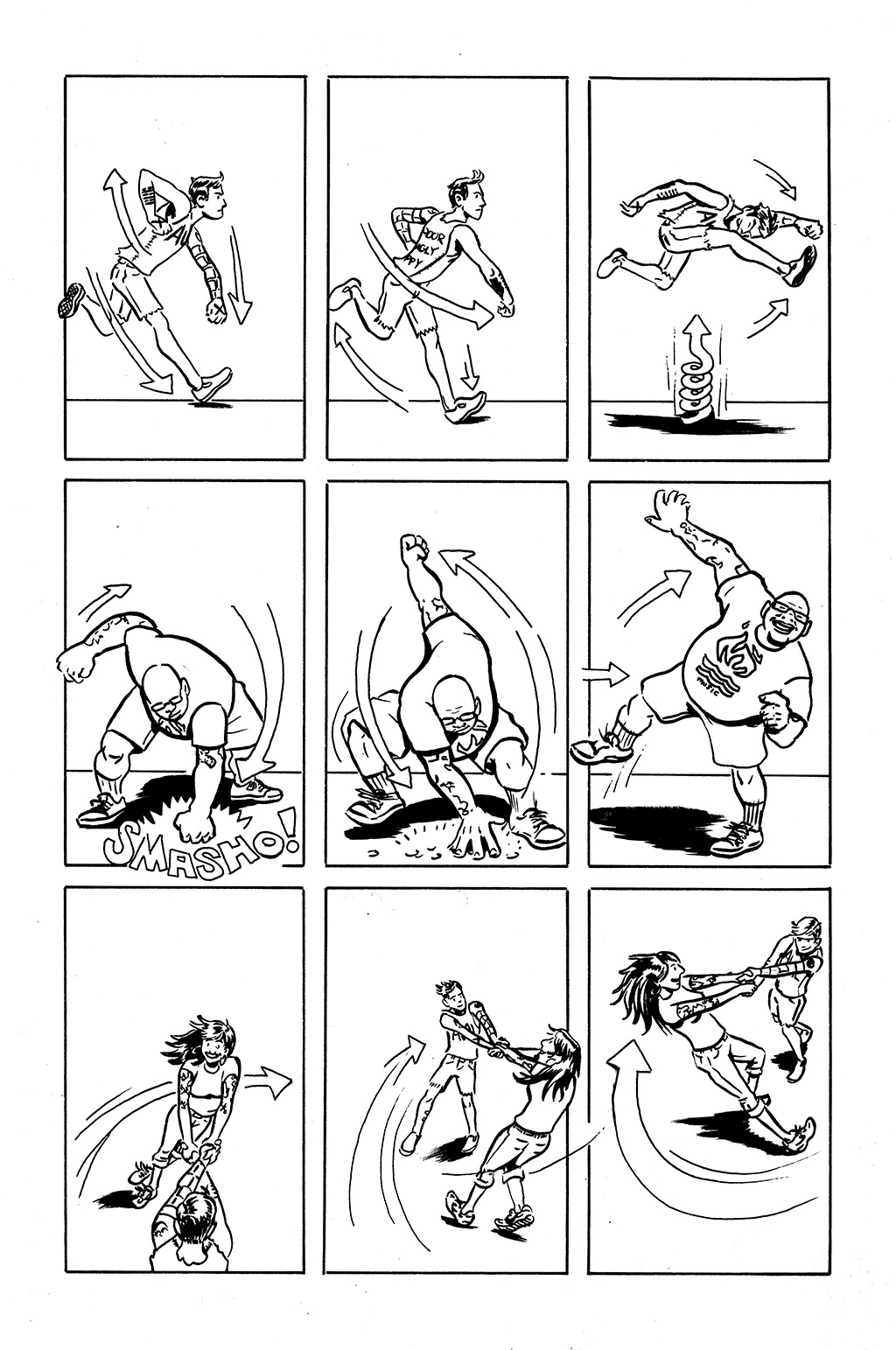
How do you define success?
Success is just living well…and by that I guess I mean to stay engaged with the world around me in interesting ways. Success is staying curious, staying active. Success is making time for friends and loved ones, but also not closing yourself off to new relationships. Success is trying to beat my fastest time around Lake Merritt, or attempting a PR in the gym. It’s making special time to just laugh and goof off with my partner. It’s new pages up on the wall and blank pages to fill on the drawing board. It means eating lots of healthy leafy vegetables, but treating myself to a vegan sundae now and again. It’s the-always-tough-to-manage balance between work and play. It is to defy complacency and apathy and contribute something new to the mix. I always think back to the idea of fight clubbing your life, and you know…not the beating each other to bloody pulps, but stripping away all the things that don’t matter and really devoting yourself completely to the things that do. In that story, one of the big questions that motivates all the space monkeys is “What do you wish you’d done before you died?” Keeping that question in mind can be a sort of compass, and a safeguard against fucking up too drastically.
If you like what you saw, then what are you waiting for? Check out more of Kettnerd’s art over here, and don’t forget to pick up the latest As You Were.
